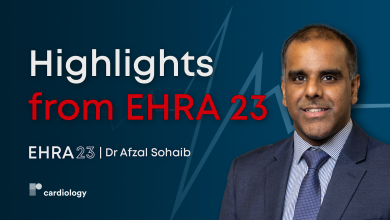Search results
Author(s):
Philipp Sommer
,
Gerhard Hindricks
Added:
3 years ago
Implantable Monitors and Atrial Fibrillation
In selected cases, implantable cardiac monitors (ICMs) can be helpful diagnostic tools for patients with unclear syncopes or undocumented arrhythmias.1 However, in the field of catheter ablation of atrial fibrillation (AF) – the fastest growing area of interventional electrophysiology in the past 10 years – there is a need for continuous rhythm…
View more
Author(s):
Maurizio Gasparini
,
Alessio Cappelleri
,
Paola Galimberti
,
et al
Added:
3 years ago
Cardiac resynchronisation therapy (CRT) is an important device-based, non-pharmacological approach that has been shown to improve the outcome in selected patients with chronic heart failure (HF). Large randomised trials have clearly demonstrated that CRT improves left ventricular (LV) function and reduces both morbidity and mortality rates.1–5 Until a few years ago, CRT was indicated in patients…
View more
Author(s):
Jason G Andrade
,
Ricky D Turgeon
,
Laurent Macle
,
et al
Added:
2 years ago
Implantable Cardiac Monitors for the Detection of Atrial Fibrillation - How Far Have We Come?
Author(s):
Christian Meyer
,
Martin Martinek
,
Helmut Pürerfellner
Added:
3 years ago
Article
Author(s):
Jason G Andrade
Added:
8 months ago
Author(s):
Afzal Sohaib
Added:
1 year ago
EHRA 2023 — In this short video Dr Afzal Sohaib, an Electrophysiologist at Barts Health NHS Trust, provides a concise and practice-focused review, highlighting the 5 most impactful trials that will influence his clinical practice.
0:14 - POTTER-AF
1:09 - Early vs Delayed Ablaion of AFib
2:20 - PowerFast III
3:29 - AdaptResponse
5:17 - Marshall-Plan
Recorded on-site at EHRA 2023, Barcelona.
…
View more
Author(s):
Alvaro Alonso
,
Antonio P Arenas de Larriva
Added:
3 years ago
Atrial fibrillation (AF) is the most common clinically-significant arrhythmia in the world.1 It is estimated that, in the US alone, approximately 2.5 million people have AF, with the condition being 1.5 times more common in men than in women.2 Despite the decline in morbidity and mortality from cardiovascular diseases in general due to advances in prevention and treatment, AF has not followed a…
View more
Author(s):
A John Camm
Added:
3 years ago
Atrial fibrillation(AF), a major cause of morbidity and mortality in the Western world, is considered to be a rising epidemic.1–3 In the US alone, approximately 2.7 million people are affected by AF4 and this figure is projected to increase to an estimated 16 million by 2050.5 The rising prevalence of AF is mainly attributable to the ageing population6 and survival from other cardiovascular…
View more
Author(s):
Moisés Rodríguez-Mañero
,
Jose Luis Martínez-Sande
,
Javier García-Seara
,
et al
Added:
2 years ago
Author(s):
Gheorghe-Andrei Dan
Added:
3 years ago
“The tragedy of science is the slaying of a beautiful hypothesis by ugly facts.”
– Thomas Huxley
The 2016 AF European guidelines specifies that the rhythm control strategy – irrespective of method – exclusively addresses the control of symptoms and improvement of quality of life, autonomy and social functioning.1 The exception, obviously, is the vital indication of acute rhythm restoration in…
View more













